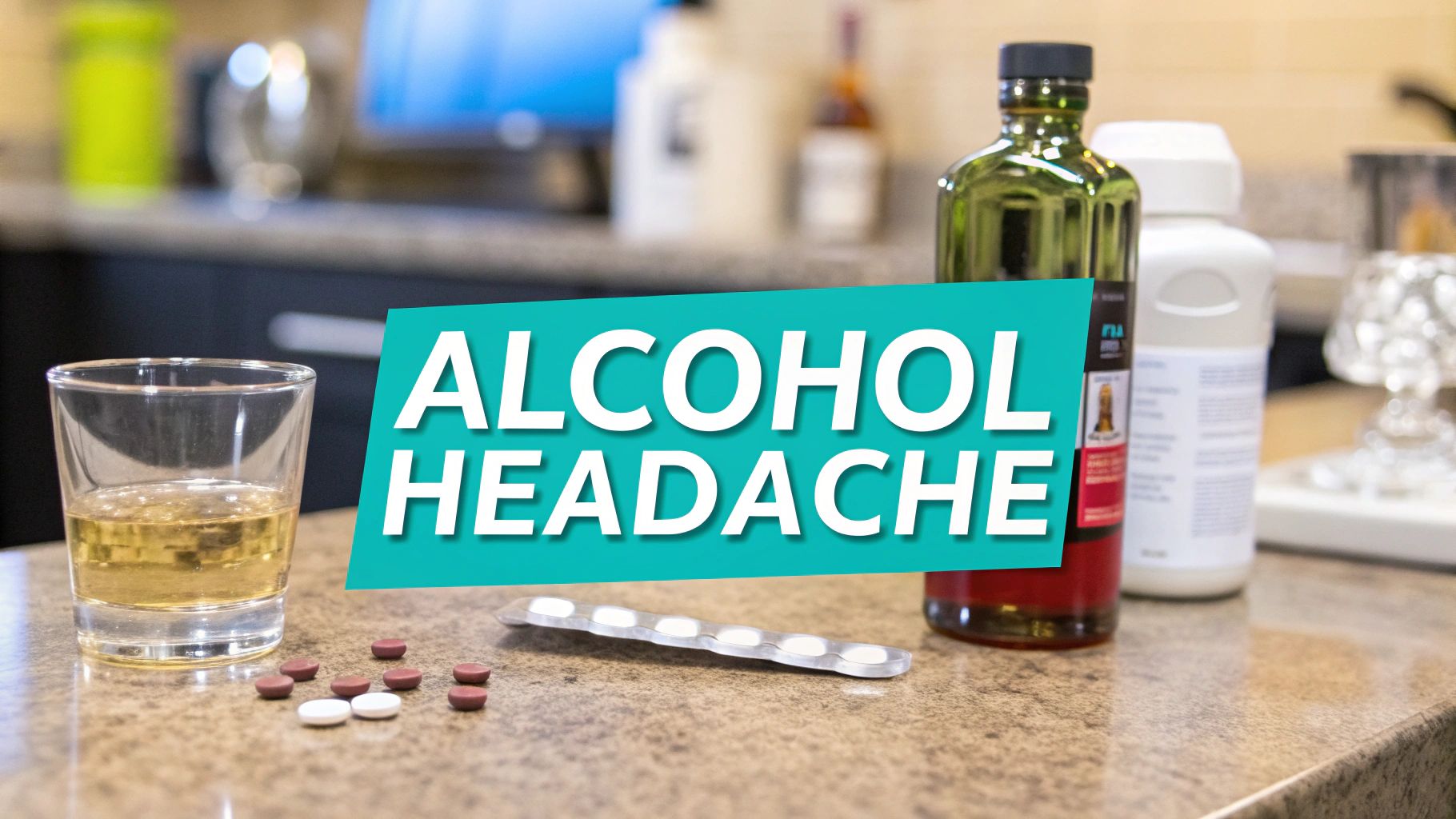

· By Annemarie
Why Does Alcohol Cause Headaches? Causes & Easy Remedies
That celebratory drink or relaxing glass of wine can sometimes lead to a seriously unwelcome, throbbing headache. Ever wondered why? It usually boils down to four key things your body does in response to alcohol: dehydration, inflammation, blood vessel expansion, and dealing with some nasty byproducts from the fermentation process.
Getting a handle on these core triggers is the first step to enjoying a drink without paying for it the next day.
The Four Main Headache Culprits
Think of your body as a finely tuned machine. When you pour in alcohol, it’s like asking it to run on the wrong kind of fuel. It’ll work, sure, but the process creates a lot of stress and junk that leads directly to that dreaded head pain. This isn't just one thing going wrong; it's a whole chain reaction.
Your body's reaction to alcohol is complicated, but the reasons for the headache are surprisingly direct. Let's break down the main culprits.
A Quick Look at Alcohol Headache Triggers
To make it simple, here’s a quick rundown of the four biological reactions that gang up on your head after a night of drinking.
| The Culprit | How It Affects Your Body |
|---|---|
| Dehydration | Alcohol is a diuretic, making you pee more and lose vital fluids and electrolytes. |
| Inflammatory Response | Your immune system can react to alcohol like it's an invader, causing inflammation. |
| Vasodilation | Alcohol makes your blood vessels expand, which can trigger pain receptors in your brain. |
| Congeners | These chemical byproducts, especially in dark liquors, are known to worsen hangovers. |
Each one of these can cause a headache on its own. When they happen together, you've got the perfect storm for a nasty one.
The infographic below gives you a great visual of how a single drink can branch out into these distinct issues.
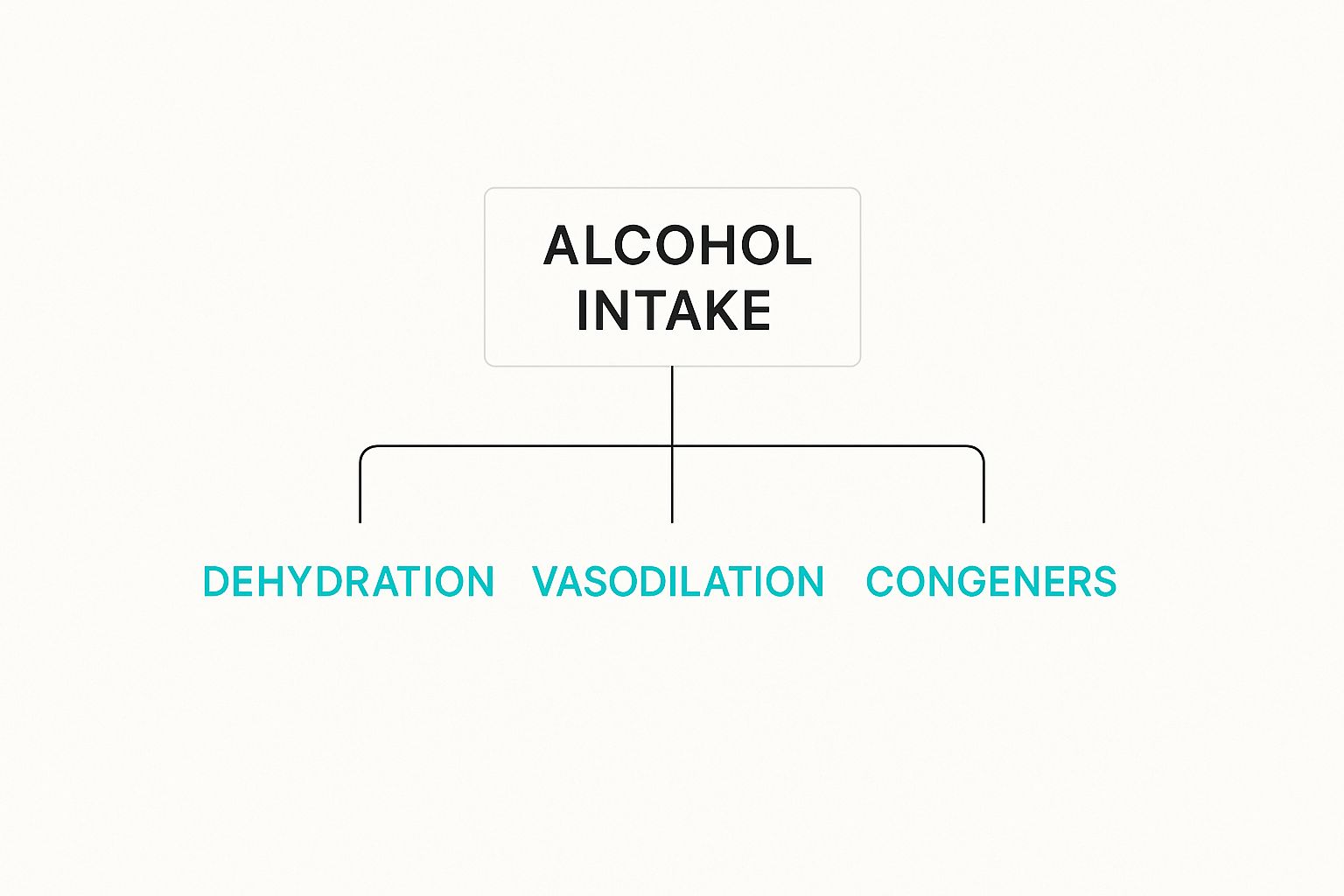
It’s pretty clear that one drink sets off a whole cascade of biological events. Each one plays its part in why you might wake up with a pounding head, showing just how much is going on behind the scenes.
How Dehydration Causes Headaches
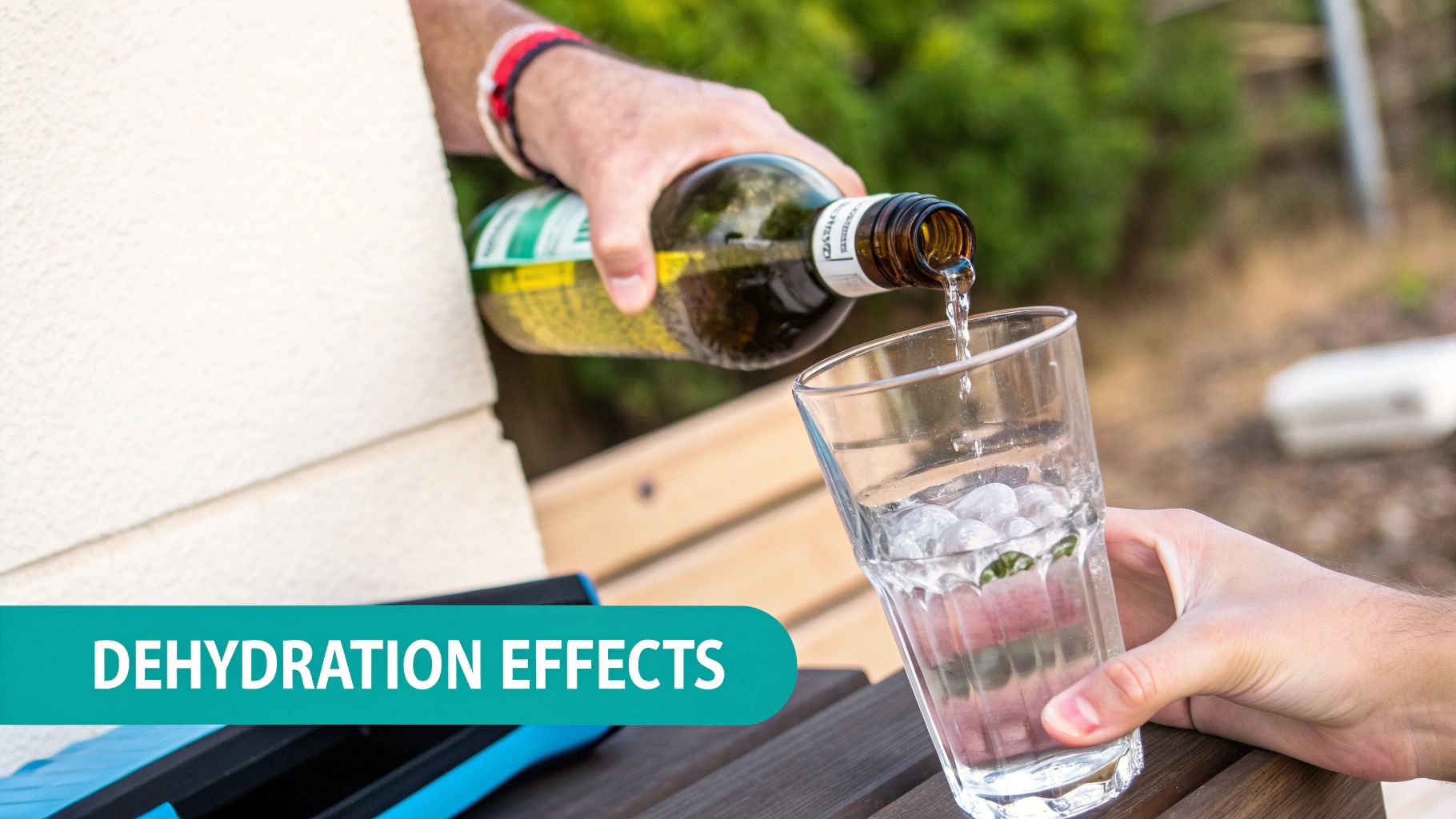
One of the biggest culprits behind that post-drinking headache is surprisingly simple: dehydration. Alcohol is a diuretic, which is just a scientific way of saying it makes you pee... a lot. Each one of those extra trips to the bathroom flushes out water and, just as importantly, essential electrolytes your body relies on.
This isn't just about feeling thirsty. When your body's fluid levels start to drop, things get serious, especially for your brain.
The Brain and Dehydration
To really get why a dry mouth leads to a pounding head, you have to picture your brain. It’s not just rattling around in your skull; it’s actually floating in a protective cushion of cerebrospinal fluid. This fluid is critical, preventing your brain from knocking against the hard bone of your skull with every movement.
When you get dehydrated from drinking, the volume of this protective fluid shrinks.
Your brain literally pulls away from the inside of your skull. This tugs on the delicate membranes connecting the two—the meninges—which are loaded with pain receptors. That throbbing, aching pain you feel? That's your meninges screaming, "Hey, we're being stretched here!"
It’s a surprisingly physical process that directly leads to that classic hangover headache. But losing water is only one part of the equation.
The Role of Lost Electrolytes
Along with all that water, you're also losing vital electrolytes. These are minerals with an electric charge, like potassium and sodium, that act as your body's messengers. They're what help your nerves fire and your muscles contract.
When your electrolyte levels get thrown out of whack from all those bathroom breaks, your nerve cells can’t communicate properly. This miscommunication can actually amplify pain signals, turning a minor ache into a full-blown, intense headache.
This is exactly why chugging plain water sometimes isn't enough to fix the problem. You've got to replace those lost minerals, too. For a deeper dive into this, you can learn more about dehydration after alcohol consumption and how to fight back effectively.
Unmasking Congeners: The Hidden Culprit In Your Drink
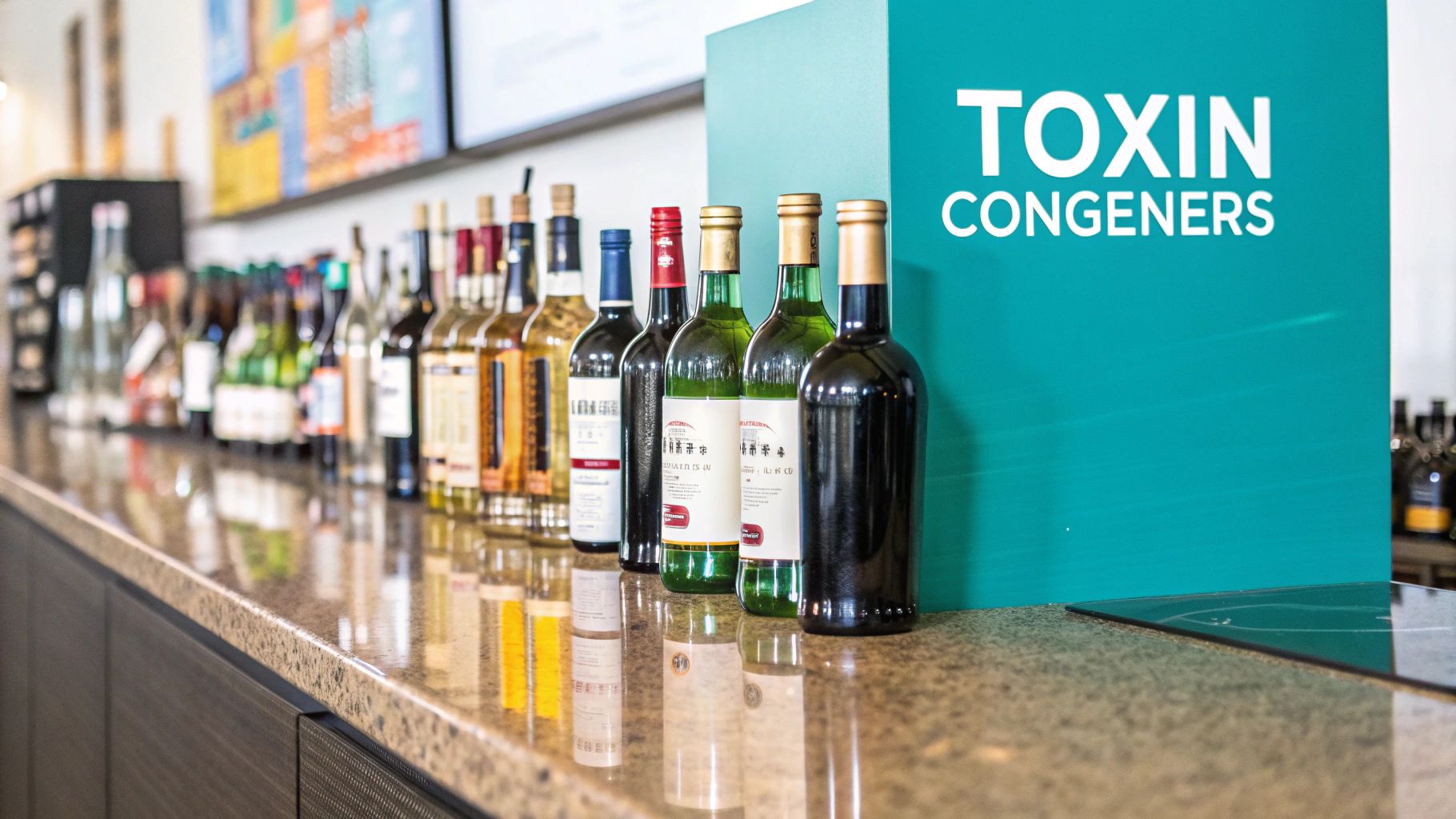
While we all know dehydration is a classic villain in the hangover story, there’s another, sneakier culprit working behind the scenes: congeners.
These are basically the chemical byproducts created during the fermentation and aging of alcohol. Think of them as the natural impurities that give drinks like bourbon or red wine their deep colors, signature aromas, and complex flavors.
These compounds include things like methanol, tannins, and acetone. While they make a dark rum taste like, well, dark rum, they’re also toxic. Your body has to pull a double shift just to break them down, putting a ton of stress on your system.
That extra metabolic workout is a huge reason why the pounding in your head feels so much worse after certain drinks.
How Congeners Worsen Your Headache
When you drink something packed with congeners, your body immediately goes on the defensive. It launches an inflammatory response to deal with these unfamiliar substances, releasing compounds that can directly trigger pain and add to that overall sick feeling.
Basically, the more congeners in your glass, the harder your body has to fight, and the more intense the aftermath will be.
Congeners are like the evil sidekicks that make the main villain—the hangover—so much worse. They’re directly linked to more severe symptoms, especially headaches, because they drag out your body's recovery time and crank up inflammation.
This is where choosing your drink wisely can be a total game-changer. Darker liquors and wines are famous for being loaded with congeners, while clear spirits have very few. Knowing which drinks are low on this stuff is your first line of defense, and it helps to know what alcohol causes the least hangover.
Congener Levels In Popular Alcoholic Drinks
Not all drinks are created equal, and understanding the differences can save you from a world of hurt. Here’s a quick comparison of typical congener content, from lowest to highest, to help you make smarter choices on your next night out.
| Drink Type | Relative Congener Level |
|---|---|
| Vodka, Gin, White Rum | Very Low |
| White Wine, Light Beer | Low |
| Dark Beer, Tequila | Medium |
| Red Wine, Whiskey, Bourbon | High to Very High |
The takeaway is pretty clear: sticking to clear liquors like vodka or gin will give your body a much easier time than opting for a bourbon or a heavy red wine. It’s a simple swap that can make a huge difference in how you feel the next morning.
Your Body's Inflammatory Reaction to Alcohol
It’s not just about dehydration or congeners. When you drink, your immune system fires up and launches a powerful inflammatory response. It essentially treats alcohol like an unwelcome guest—or even an infection—and this defensive reaction is a huge reason why you feel so awful the next day.
To fight what it perceives as a threat, your immune system releases inflammatory messengers called cytokines. Normally, these proteins are your body's best allies, helping coordinate the fight against actual viruses and bacteria. But when alcohol is the trigger, they cause widespread inflammation that leads directly to fatigue, muscle aches, and that signature throbbing head pain.
Ever notice how a bad hangover feels a lot like you're coming down with the flu? That’s your immune system in overdrive. It’s a full-body response, not just something happening in your head.
The Gut-Headache Connection
The inflammatory cycle doesn’t stop there. Alcohol is a notorious irritant for the stomach lining and the entire digestive tract. This irritation pokes the bear, provoking your immune system even further and adding more fuel to the inflammatory fire.
This stress on your gut makes the whole situation worse, which is why nausea and general discomfort almost always come along with the head pain. Getting a handle on this reaction is key, and a good place to start is by exploring this list of anti-inflammatory foods.
Alcohol is a major risk factor for many health conditions, contributing to over 200 diseases and injuries worldwide. The global alcohol-attributable death rate was approximately 30 deaths per 100,000 people in 2019, highlighting the broader context of alcohol's impact. Discover more insights about alcohol consumption statistics on Our World in Data.
Ultimately, your body is working hard to process the alcohol and clean up the inflammatory mess it left behind. That’s why a headache from drinking can feel so persistent and draining. Your immune system is going into battle, and your head is paying the price.
The Difference Between a Hangover and a Migraine
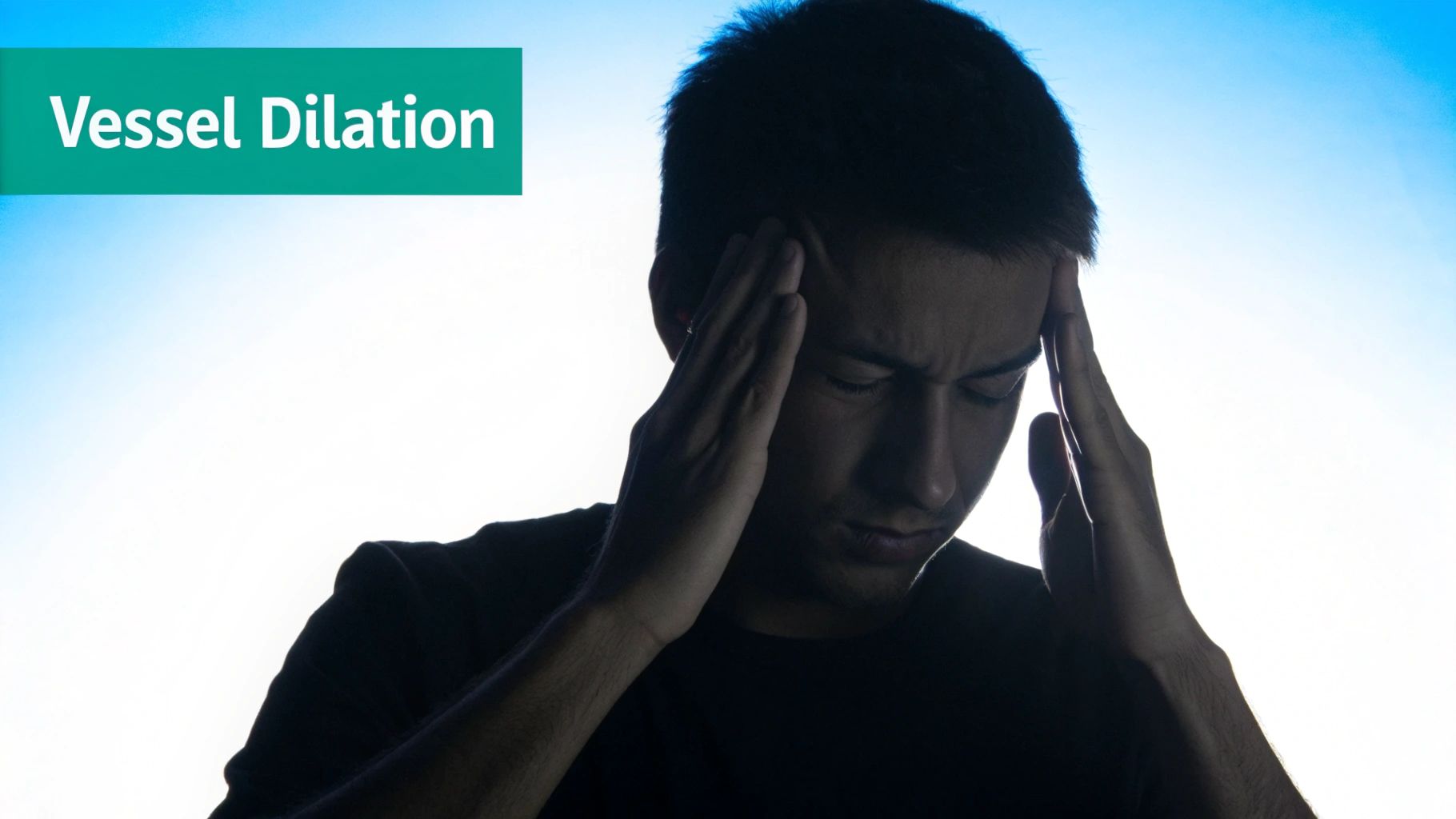
Sometimes, the agony you feel after a few drinks is way more intense than your typical, run-of-the-mill hangover. For people who are already prone to migraines, alcohol can be more than just a bad habit—it can be the direct trigger for an absolutely debilitating neurological event.
Getting this distinction right is crucial. A standard hangover headache usually feels like a dull, throbbing pain. It’s mostly your body screaming at you about dehydration and inflammation. A migraine, on the other hand, is a whole different beast that alcohol can wake up in certain people.
So what's happening in your body? Alcohol’s effects, like vasodilation (which is just a fancy way of saying your blood vessels are widening) and its meddling with brain chemicals like serotonin, can directly flip the switch on the migraine pathways in your brain.
More Than Just a Headache
A migraine attack is a full-body experience that makes a simple headache look like child's play. It comes with its own unique and severe set of symptoms.
Spotting these differences is key if you suspect your post-drinking pain is something more serious. A migraine often brings friends to the party, like:
- Aura: Think visual weirdness, like flashing lights or blind spots that show up before the real pain kicks in.
- Intense Pain: A brutal, pulsing pain that often picks a side of your head and stays there.
- Sensory Sensitivity: Suddenly, bright lights (photophobia) and loud noises (phonophobia) are your worst enemies.
- Nausea and Vomiting: Your stomach gets in on the action, and it’s not pretty. This is a big red flag.
Did you know? A mind-boggling 3.1 billion people across the globe suffer from headache disorders, and they tend to hit females harder. While the science is still evolving, there's growing evidence that alcohol can roll out the red carpet for both tension headaches and migraines. You can dive deeper into the research on the link between alcohol and headaches on PMC.
If your "hangovers" consistently check these boxes, you might be dealing with alcohol-triggered migraines. That means you need a completely different game plan than just chugging water and hoping for the best.
Alright, we've gone deep into the science of why your head feels like it's in a vice grip after a few drinks. But knowing why it happens is only half the battle. Let's talk about what you can actually do to stop it from happening in the first place.
Think of this as your game plan for a better morning. A few smart moves before and during your night out can make all the difference.
The best defense starts long before your first sip. Whatever you do, don't drink on an empty stomach. Putting down a solid meal first—something with healthy fats, protein, and complex carbs—is a game-changer. It slows down how fast your body absorbs the alcohol, giving your system a fighting chance to process everything without getting overwhelmed.
Pace Yourself and Hydrate Like a Pro
Water is your absolute best friend on a night out. Seriously. For every alcoholic drink you have, make it a habit to down a full glass of water. This simple trick fights back against the diuretic effect of alcohol, keeping you from getting dehydrated and preventing that painful brain-shrinkage we talked about.
Pacing is just as crucial. Your liver is a workhorse, but it has its limits—it can only process about one standard drink per hour. If you go faster than that, you're just flooding the engine.
It's not just about drinking less, it's about drinking smarter. Give your body what it needs to keep up: food, water, and time. That’s your most powerful weapon against a morning-after headache.
Choose Your Drinks Wisely
Finally, pay attention to what's actually in your glass. As we covered, those darker drinks are packed with congeners, the pesky compounds notorious for making headaches a whole lot worse.
If you want to minimize the next-day pain, try making a few strategic swaps:
-
Instead of: Bourbon or dark rum
Try: Vodka or gin -
Instead of: Red wine
Try: White wine or a cocktail with a clear spirit
And don't forget the final piece of the puzzle: sleep. Getting a good night's rest is non-negotiable. Your body does its most important repair work while you're asleep, so giving it plenty of time to recover can be the difference between waking up refreshed and waking up miserable.
Still Have Questions About Alcohol Headaches?
Even after digging into the science, a few common questions always seem to surface when we talk about that dreaded post-drinking head-pounder. Let's clear them up so you can make smarter choices on your next night out.
Does the Type of Alcohol Really Matter?
Absolutely. We've touched on this already, but it’s a big one. Darker spirits like whiskey and that bottle of red wine are packed with congeners—chemical byproducts that are notorious for making hangover headaches so much worse.
On the flip side, you've got clear spirits like vodka, gin, and white rum, which have way fewer congeners. If you know you're prone to head pain after a few drinks, sticking with these is often a much safer bet. Your body will thank you for it.
Can I Just Take a Pain Reliever Before Bed?
It’s a tempting shortcut, but definitely not one we'd recommend. Popping certain pain relievers, especially acetaminophen (the active ingredient in Tylenol), while alcohol is still swimming around in your system can seriously stress out your liver. It's much, much safer to just wait until the morning.
If you wake up needing relief, an NSAID like ibuprofen is generally a better option, but only after you’ve had some water and a bite to eat. When it comes to mixing meds and alcohol, playing it safe should always be the priority.
Why Do I Get a Headache After Just One Drink?
It’s frustrating, but for some people, even a single drink is enough to kick off a headache. This kind of hypersensitivity can be a sign of an intolerance to other compounds in your drink, like sulfites or histamines, which are common culprits in wine. And if you're a migraine sufferer, pretty much any amount of alcohol can be a direct trigger for an attack.
It's also worth remembering that the issue isn't always just your one drink. The global picture of alcohol consumption is pretty staggering; in 2020, an estimated 1.34 billion people drank harmful amounts, which feeds into a whole host of serious health problems. You can learn more about global alcohol use on Healthdata.org.
Ready to enjoy your night without dreading the morning after? Upside has your back with our Hangover Jelly. It's a smart, on-the-go solution packed with proven, natural ingredients designed to support your body and help you wake up feeling great. Grab a box and see the difference for yourself at https://enjoyupside.com.
#upside #enjoyupside #upsidejelly #livemore #hangovercure #hangoverprevention #fighthangovers #preventhangovers #HangoverRelief #MorningAfter #PartySmarter #HydrationStation #WellnessVibes #RecoverFaster #NoMoreHangovers #HealthyParty #HangoverHacks #FeelGoodMorning #NightlifeEssentials #HangoverFree #SupplementGoals #PostPartyPrep #GoodVibesOnly #HealthAndParty #HangoverHelper #UpsideToPartying
